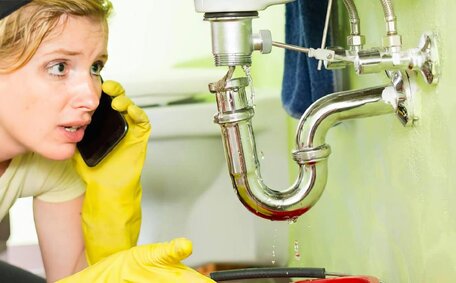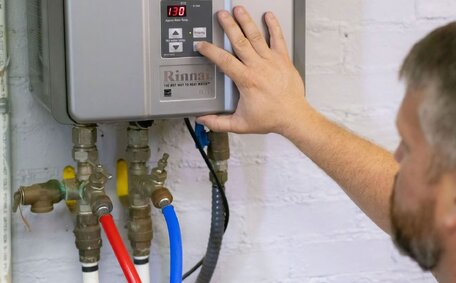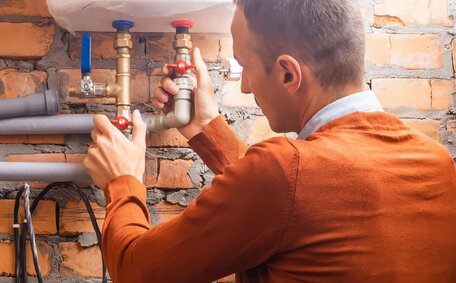Introduction: Knowing When to Call a Plumber or Appliance Technician
However, correctly pinpointing the trouble zone is just one way to save significant time and cost.
This article outlines key differences between and provides practical guidance on recognising issues, taking appropriate action, and seeking professional assistance for residential plumbing versus appliance systems. When household issues arise involving either plumbing or appliances, it’s not always apparent whether a plumber or appliance technician is needed.
We aim to empower readers with the knowledge to address problems confidently while awaiting expert repairs. We aim to empower readers with the knowledge to address problems confidently while awaiting expert repairs. Ultimately, We aim to conserve precious time money, offering guidance that can assist you in making wise choices when faced with a plumbing emergency.
Keep exploring to see our insightful ways to tell if you’re grappling with a leaky pipe or faulty appliance.
Common Signs of a Plumbing vs Appliance Problem
There is a clear difference between key signs of a plumbing issue and an appliance problem:
- Water leaks - A plumbing problem often involves water leaking from pipes, faucets, water heaters etc. Water heaters among other appliances, tend to leak only internally or at inlet/outlet connections.
- Noises - Loud banging in pipes indicates plumbing problems like loose fittings or water hammer. Your appliances like washing machines and dishwashers tend to make buzzing, grinding or humming noises.
- Blocked drains - Plumbing blockages causing gurgling sinks, slow drainage or sewer backups point to issues like tree roots, grease, debris buildup etc. Appliance issues don’t involve your home’s plumbing drain system.
- Gas smells - Strong gas smells, a specific type gas scent, signify plumbing leaks near gas appliances or pipes. Burning/electrical smells point to appliance failure.
- Functionality loss - Toilets, faucets or showerheads with flow problems signal plumbing repairs needed. Appliances not heating, cleaning or starting suggest electronic/mechanical issues.
Awareness of these some most typically observed signs can assist you in accurately discerning whether plumbing or appliance troubleshooting is warranted when difficulties emerge.
Leak Detection: Pinpointing the Source
When confronting a leak of any nature, swiftly pinpointing its origin and determining when call the plumber is pivotal to avert unnecessary water loss and additional structure harm. Start by examining areas showing signs of moisture for clues. Check your water system, including the roof, ceilings, walls and floors for water stains or pooling to trace the leak’s path back to the source.
Also inspect the condition of visible pipes and supply lines. Cracks, corrosion, joint separations or ruptures indicate a compromised plumbing system requiring repair. Monitor for drips or damp spots around your water supply lines, under sinks, behind appliances and near toilets or tubs, which are telltale hints of a burst water pipe.
For mystery leaks without an apparent trail, specialised leak detection services employ advanced techniques like thermal imaging scans and underground water pipe tracing. These methods can take credit for uncovering elusive concerns like a slab leak or burst pipe.
Bear in mind, each leak unveils a deeper concern that professional plumbers can handle with the necessary repair. Catching minor drips early prevents extensive further damage and repairs down the road. Don’t hesitate, give us call for a professional plumber’s leak detection service to swiftly attend to shortcomings in your plumbing infrastructure.
Immediate Damage Control and Safety Steps
If you suspect a plumbing issue, soliciting help from residential plumbers quickly is crucial to prevent further building damage and ensure safety. Here are some key steps to take:
- Turn off water supply at the mains or shut off power at the fuse box if an electrical appliance is leaking. This stops more flooding water or risk of electrocution.
- Use towels, buckets and containers to catch dripping water, contain leaks and check for carbon monoxide risks as an interim measure before repairs.
- Check for dangers like exposed wires, gas smells, soggy ceilings at risk of collapse or flooded electrical areas. Evacuate the area if hazards are present.
- call emergency plumber services 24/7 or appliance repair technician for urgent assistance and preventative repairs if major damage has occurred or risks are present.
- Document the damage through photos/video as evidence for insurance claims if needed.
- If mains plumbing pipes have burst and water is rapidly spreading, evacuate the building and call emergency services.
Implementing these basic measures can help prevent a crisis, enabling you to promptly contact an emergency plumber to resolve plumbing emergencies as assistance is en route. Priority should always be on safely minimising immediate risks to people or property in an emergency plumbing issue.
Determining if Professional Help is Needed
Gauging if a plumbing or appliance anomaly in your abode mandates expert intervention from residential commercial plumbers hinges on the problem your domicile is facing. Minor leaks, noises or functionality loss may be DIY-fixable. But in most cases, significant water damage, a gas leak, slab leaks or burst pipes warrant immediate expert help.
Conversely, for several prevalent plumbing conundrums, a plumber need to be contacted immediately should you experience:
- Major water damage to walls/ceilings
- Bad odours that could indicate a blocked sewer line trouble
- Large leaks rapidly spreading
- No hot water
- Gas smells indicating dangerous leaks
For your hot water heater woes among other hot water system issues, pursue an appliance repair plumber for effective solutions:
- Leaking water heaters
- Refrigerant leaks from refrigerators
- Faulty wiring/components causing shock/fire risk
- Built-in appliances not starting up
For trifling concerns with your plumbing and drainage apparatus, homemade remedies may serve as a stopgap prior to complete restorations. But incorrectly assessing the severity of problems can cause issues to worsen long-term.
We advise calling your local trusted technicians like Ashfield Plumbing if unsure - catching problems early prevents expensive damage. And it’s clear when to call in professionals, who can accurately diagnose issues to recommend appropriate solutions.
DIY Troubleshooting Tips and Temporary Fixes
When minor plumbing or appliance dilemmas surface, we can help with some basic DIY troubleshooting steps you can attempt before professional repair arrives:
- For your appliance problems, check that the power supply is connected and functional at the fuse box before assessing the unit itself.
- For plumbing troubles such as leaking taps, take note of low water pressure to determine if poor water flow is an indicator a plumber’s expertise is needed due to fixture blockages or issues with the main water line.
- at your earliest convenience, soon possible, address your drains, handle a blocked drain or minor sink clogs using a plunger or drain snakes before summoning a plumber.
- Temporarily seal minor leaks at pipe joints or connections with leak-blocking tape.
- Improve flushing performance in fixtures like running toilets by examining the interior assembly for obstructions and cleaning as needed.
Ensure your personal safety and skill adequacy with any home repairs, and you should call in a plumbing expert to resolve the issue if needed. Attempting to fix problems with water fixtures running toilets improperly, gas and electricity can be hazardous if mishandled. If you have doubts or feel uncomfortable making fixes, call our Ashfield plumbing professionals to assess and repair issues promptly and completely.
Questions to Ask Yourself to Diagnose the Root Cause
Pinpointing the origin of your household issue involves asking some key questions:
- Have you made any recent changes, like installing new appliances or remodelling plumbing components that could be connected?
- Have usage patterns increased, e.g. extra laundry loads or dishwasher runs that can lead to overtaxing utility systems or a pipe burst?
- Have there been any leaks, bursts, faults or blockages in the past indicating pre-existing deficiencies?
- When did the problem start - was it sudden or gradual over time?
- Where exactly is the issue located and is it isolated or systemic throughout the home?
Analysing these factors highlights the differences between residential issues, which helps determine whether to repair replace components as the best solution. they’re able to clarify if stopgap DIY fixes may work or if professional intervention is urgently needed. Understanding root causes is the key first step before any repairs can begin.
Knowing When to Call a Plumber vs Appliance Technician
Determining whether to call a plumber or an appliance technician depends on correctly identifying the root cause of the issue, be it commercial or residential. As Ashfield’s trusted local plumber, we have the expertise to address residential commercial plumbing problems like leaky your pipes, burst water heaters, blocked drains, and more.
Dial our emergency plumbing services, functioning every hour of the day, immediately if you encounter gas leaks or similar urgent matters:
- Significant leak water occurrences can result in or contribute to severe flooding
- Sewer line backups
- Gas smells indicating dangerous leaks
- Disruption in your hot water provision
- Burst water pipes
For washing machine breakdowns unrelated to plumbing systems, contact a reputable appliance repair professional instead. This can also include issues with units like washing machines, where there is no leakage or flood risk involved.
When comes to the pivotal moments, plumbing issues demand specially trained professional plumbers for the finest solutions. Our team at Ashfield Plumbing has the skills and experience to diagnose issues accurately and recommend appropriate solutions to restore functionality safely. Don’t hesitate to get in touch regarding emergency repairs or preventative maintenance.
Preventative Maintenance to Reduce Future Risk
Here some proactive preventative maintenance tips for plumbing and appliances to prevent minor issues from escalating over time. This saves money by avoiding major component failure or building damage.
For residential plumbing, periodically inspect exposed pipes, sump pump integrity and fittings for leaks or corrosion. Check for low water pressure and drainage systems flowrates for reductions indicating internal blockages. Maintain drains by flushing with hot water and non-toxic drain cleaners monthly. Maintain drains by flushing with hot water and non-toxic drain cleaners monthly.
Have your gas fitting lines professionally inspected by a gas fitter, along with water heaters, sewer lines and other critical systems using leak detectors, pressure gauges and pipe cameras annually. They can pinpoint concealed risks like micro-fractures and recommend repairs for prevention.
For your plumbing needs, check and clean or replace filters regularly per manufacturer instructions. Keep seals and connections debris-free and lubricate any moving parts as directed. Arrange timely services to assess functionality and head off problems.
Document equipment age/warranties to plan for proactive replacements. Ensure electrical outlets can sustain appliances’ power demands and usage levels don’t overload capacities. Update ageing units exceeding 10 years old before component failures cause damage.
For commercial buildings in Sydney, it’s wise to establish thorough maintenance contracts with commercial plumbers Sydney based for expert plumbing work. Specialists in commercial plumbing systems frequently examine all elements with meticulous attention, earnestly observing any wear and changes. This tactic captures even the smallest of issues early on, manages hazards in complex plumbing networks, and averts the steep expenses associated with emergency interventions.
Conclusion: Being Prepared for Home System Issues
Having the ability to correctly identify and address common plumbing problems with commercial residential plumbing expertise and appliance issues can give homeowners greater confidence and prevent costly damages. By learning key differences in residential vs commercial issues and signs, implementing safety steps, trying temporary DIY fixes, and reaching out for further information or expert assistance on time, you take control when problems arise.
We encourage maintaining vigilant preventative care as well so minor vs commercial plumbing repairs don’t balloon into emergencies. Keep records of equipment ages, warranty periods, and grasp when to call maintenance services, as one more duty where commercial plumbers can be engaged for large-scale systems. For extensive systems, youll need strict professional maintenance contracts with commercial plumbers to catch problems early.
Ultimately, stay informed on best practises and understand the nuances between residential commercial plumbing jobs when reaching out to trusted local experts like Ashfield Plumbing. Our qualified technicians ensure all your concerns are addressed, making the process smooth and stress-free by providing solutions tailored to your unique needs with each service call.
Don’t hesitate to email or call our friendly team for residential and commercial plumbing repairs, maintenance and advice. We also offer 24 hours a day, 7 days a week availability for emergency plumbing issues to ensure your property and people are protected when urgent issues arise.






